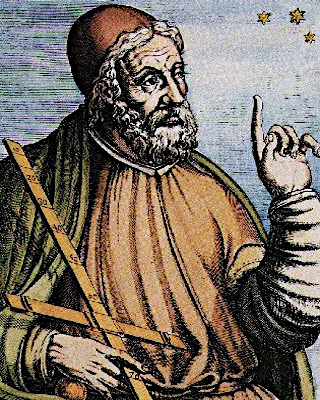
Claudius Ptolemy (c. 90 – c. 168 AD) was a major figure in ancient astronomy, whose works influenced science for over a thousand years. Born in Thebaid (Upper Egypt) under Roman rule, he lived and worked in Alexandria, then the intellectual center of the Mediterranean world. His full name, Klaúdios Ptolemaîos, reflects his Greco-Egyptian cultural heritage.
Although few details about his personal life have survived, his monumental work demonstrates a systematic and mathematical approach to natural phenomena. Ptolemy synthesized the knowledge of his predecessors Aristotle (384-322 BC) and Hipparchus (190-120 BC) while adding decisive innovations.
His most famous work, the Almagest (c. 150 AD), presents a cosmological model where the Earth, immobile, occupies the center of the universe. This geocentric system explained the apparent motion of planets through combinations of circles:
Although incorrect, this model allowed predicting planetary positions with sufficient accuracy for the needs of the time. It dominated astronomy until the works of Nicolas Copernicus (1473-1543) and Galileo Galilei (1564-1642).
Ptolemy also revolutionized cartography with his Geography. He introduced:
His maps, though inaccurate for Africa and East Asia, remained the reference in Europe until the 15th century. Christopher Columbus (1451-1506) drew inspiration from them for his voyage to the Indies.
Ptolemy was also a pioneer in several fields:
| Work | Field | Key Contribution | Legacy |
|---|---|---|---|
| Harmonics (c. 160 AD) | Music | Theory of musical intervals based on mathematical ratios (1:2 for the octave) | Founded Western music until the Renaissance |
| Optics | Physics | Study of light reflection and refraction (law of reflection) | Precursor to geometric optics |
| Tetrabiblos | Astrology | Astrological system linked to the 4 elements (fire, earth, air, water) | Lasting influence on Western astrology |
Ptolemy's work illustrates both the genius and limitations of ancient science:
As noted by Albert Einstein (1879-1955): "Ptolemy's science was a masterpiece of logic and imagination, even though his world system was wrong."
| Author | Work | Year | Contribution |
|---|---|---|---|
| G.J. Toomer | Ptolemy's Almagest | 1984 | Annotated translation of the Almagest (modern reference) |
| J.L. Berggren & A. Jones | Ptolemy's Geography: An Annotated Translation | 2000 | Critical analysis of Geography with reconstructed maps |
| O. Neugebauer | A History of Ancient Mathematical Astronomy | 1975 | Study of Ptolemy's mathematical methods |